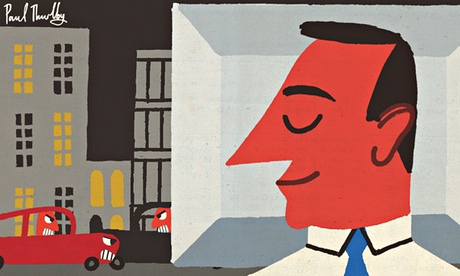
On the worst kind of New York day – soon after heavy snow, when everything’s covered in a slurry of mud, slush and litter – I stepped off a busy street into the lobby of a building I’d not visited before. I gave my name to the doorman, who murmured in recognition, and made my way down a corridor. I typed a code into a keypad and the door of a suite clicked open. If this sounds shady, it won’t help to add that I was paying for it by the hour. But all I did when I got inside – a spotless room, with Scandinavian furnishings and a yoga mat – was to write part of this column and stare out the window. I’d booked the space through Breather, a startup offering “peace and quiet on demand”: spaces for around £20 an hour, currently only in New York, San Francisco, Ottawa and Montreal. (To pre-empt your questions: the rules include “a zero tolerance policy for anything illegal or inappropriate”, and rooms are cleaned after use.) Breather’s a fabulous idea. On the other hand, it’s troubling that it’s a fabulous idea. What does it say about the world that there’s money to be made in giving people a few minutes to hear themselves think?
This is one example of an appetite for what you might, were you a columnist intent on giving irritating names to spurious trends, call “micro-retreats”. Breather’s rooms can be used for run-of-the-mill meetings, but the target market is those seeking focus, reflection and quiet. A more extreme twist on the theme is Nutshell, a canvas hood, or “collapsible privacy shield”, that you pull over your head and torso for a quick workplace break. Thankfully – since it makes the user look like a hostage – this turned out to be an art-school project. But the hunger for a little peace is real enough: the yearning for a protected zone, free not simply from outside interruptions, but from all the ways we’ve devised, using technology, to distract ourselves; the interruptions we invite. (Breather’s spaces do have Wi-Fi, but the fact that I was paying made frittering the time on Twitter less appealing.)
The solid insight behind this possibly spurious trend is that we shouldn’t think of retreat and restoration as things to do only occasionally – every weekend, if you’re lucky; or for two weeks in summer; or at some hypothetical point that never seems to arrive. As author and workplace consultant Tony Schwartz argues, this vastly underestimates the role of restoration in human life. We operate on a multitude of rhythms, from the seasonal to the circadian (or daily) to the “ultradian” – the peaking and dipping of energy every two hours or so. Each cycle must alternate between exertion and rest if we’re to function well; Schwartz recommends working in bursts of 90 minutes, followed by half-hour breaks if you can. You needn’t rent a room for this, obviously: a walk in the park might do the trick. And please don’t put a bag over your head. The point is just that micro-breaks are no less important than an annual week at the beach. I re-emerged on to the street unmistakably lighter in spirit. And, yes, almost immediately stepped in an ankle-deep puddle of oily muck. But anyway.
• Follow Oliver on Twitter.
oliver.burkeman@theguardian.com

